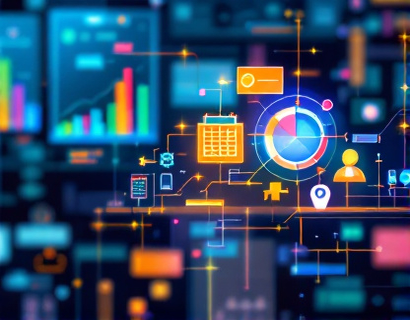AI-Powered Mental Health Navigator: Transforming Access to Psychiatric Services and Industry Knowledge
The integration of artificial intelligence in the mental health sector has paved the way for innovative solutions that enhance access to specialized insights and support. An AI-powered chatbot designed to navigate the complex landscape of psychiatric services and the mental health industry is revolutionizing how users, ranging from children and students to healthcare professionals, interact with and understand mental health topics. This advanced tool not only ensures the accuracy and safety of the information provided but also empowers users to engage confidently and responsibly with sensitive subject matter.
Understanding the Need for Specialized Insights
The mental health landscape is intricate, involving a wide array of services and professional roles that can be overwhelming for anyone seeking information. Traditional methods of accessing this information, such as extensive research through medical journals or direct consultations with experts, can be time-consuming and sometimes inaccessible to those who need it most. An AI-powered chatbot addresses these challenges by offering a streamlined, user-friendly interface that delivers specialized insights directly to the user's device. This technology is particularly beneficial for individuals who may not have easy access to mental health resources or who prefer a more interactive and immediate form of information gathering.
Ensuring Content Accuracy and Safety
One of the most significant advantages of using an AI-powered chatbot in the mental health domain is its ability to provide content that is rigorously verified for accuracy and safety. This is crucial, especially when the audience includes children and students, who may not have the critical skills to discern reliable information from misinformation. The chatbot's content verification process involves cross-referencing information with reputable sources and adhering to strict guidelines set by mental health professionals. This ensures that users, regardless of their background or level of expertise, receive trustworthy and safe information.
Empowering Diverse User Groups
The chatbot is designed to cater to a diverse audience, including children, students, mental health enthusiasts, educators, and healthcare professionals. For children and students, the chatbot offers a simplified version of information, using language that is easy to understand and concepts that are relatable. This child-friendly version is not only educational but also helps demystify mental health topics, reducing stigma and encouraging open discussions. For students, the chatbot serves as a valuable resource for research projects and personal learning, providing detailed yet accessible insights into various aspects of the mental health industry.
For mental health enthusiasts and those interested in the field, the chatbot offers in-depth information on topics such as different therapeutic approaches, the latest research findings, and the roles of various professionals in the mental health sector. Educators can leverage the chatbot to enhance their curriculum, providing students with up-to-date and accurate information on mental health. Healthcare professionals, including doctors and nurses, can use the chatbot to stay informed about the latest developments in psychiatric services and industry standards, ensuring they provide the best possible care to their patients.
Interactive and Personalized User Experience
The AI chatbot is designed to engage users in a conversational manner, making the process of seeking information both interactive and personalized. Users can ask questions, request specific types of information, and even explore topics based on their interests or needs. The chatbot's natural language processing capabilities allow it to understand and respond to a wide range of queries, from basic questions about mental health symptoms to more complex inquiries about treatment options and professional resources. This personalized approach not only enhances user satisfaction but also increases the likelihood of users returning to the chatbot for future information needs.
Building Trust Through Transparency
Trust is a critical component in any mental health resource, and the AI chatbot addresses this by being transparent about its capabilities and limitations. Users are informed that the chatbot is an AI tool designed to provide information based on verified sources, but it is not a substitute for professional medical advice. This transparency helps build trust and ensures that users understand the nature of the information they are receiving. Additionally, the chatbot provides links to reputable mental health organizations and professional guidelines, allowing users to further verify the information and explore topics in more depth.
Enhancing Accessibility and Inclusivity
Accessibility and inclusivity are core principles in the design of the AI chatbot. The platform is accessible to users with disabilities, adhering to web accessibility standards such as WCAG. This ensures that individuals with visual, auditory, or motor impairments can navigate the chatbot with ease. The chatbot also supports multiple languages, making it a valuable resource for non-native speakers and diverse communities. By breaking down barriers to information access, the chatbot promotes inclusivity and ensures that mental health resources are available to all, regardless of background or ability.
Supporting Mental Health Education and Awareness
The AI chatbot plays a significant role in supporting mental health education and awareness initiatives. By providing accurate and up-to-date information, the chatbot helps dispel myths and reduce stigma associated with mental health issues. It can offer tips on maintaining mental well-being, signs of common mental health conditions, and steps to seek help. For educators, the chatbot can serve as a tool to integrate mental health education into school curricula, fostering a generation that is more informed and empathetic towards mental health issues. Mental health enthusiasts can use the chatbot to deepen their understanding and become advocates for mental health awareness in their communities.
Facilitating Professional Development
For healthcare professionals, the AI chatbot is an invaluable tool for professional development. It provides the latest research articles, clinical guidelines, and best practices in psychiatric services, helping professionals stay current with industry standards. The chatbot can also assist in continuing education by suggesting relevant courses and certifications. By offering a centralized source of professional development resources, the chatbot supports the ongoing education and skill enhancement of mental health professionals, ultimately leading to better patient care.
Addressing Ethical Considerations
The development and implementation of an AI-powered mental health chatbot come with ethical considerations that must be carefully addressed. Privacy and data security are paramount, with the chatbot adhering to strict data protection regulations such as GDPR and HIPAA. User data is encrypted and stored securely, ensuring that personal information is protected. Additionally, the chatbot is designed to respect user autonomy and confidentiality, avoiding any form of data sharing without explicit user consent. Ethical guidelines are also in place to prevent the chatbot from providing harmful or unethical advice, with built-in safeguards to detect and respond to sensitive or crisis situations appropriately.
Conclusion
The AI-powered mental health navigator represents a significant advancement in making specialized insights into psychiatric services and the mental health industry accessible to a broad audience. By ensuring content accuracy and safety, empowering diverse user groups, and fostering a culture of trust and inclusivity, this chatbot is transforming the way people engage with mental health topics. As the mental health landscape continues to evolve, tools like this AI chatbot will play an increasingly vital role in supporting individuals and professionals alike, promoting mental well-being and fostering a more informed and compassionate society.











































